Climate change has emerged as a key issue in the 2020 Democratic primary season. Candidates are debating how best to address the subject, which many Americans see as a growing national priority. As 14 states and one territory prepare to hold primaries or caucuses on Super Tuesday, here’s a look at how Democrats see climate change – and how their views differ from those of Republicans.
The data for this post was drawn from multiple surveys. The most recent was a survey of 12,638 U.S. adults, including 10,491 registered voters (5,861 of whom are Democrats or lean to the Democratic Party) conducted Jan. 6-19, 2020.
The Jan. 6-19, 2020, October 2019 and September 2019 surveys were conducted using the American Trends Panel (ATP), an online survey panel that is recruited through national, random sampling of residential addresses. This allows for nearly all U.S. adults to have a chance of selection. The surveys are weighted to be representative of the U.S. adult population by gender, race, ethnicity, partisan affiliation, education and other categories. Read more about the ATP’s methodology. A separate survey was conducted Jan. 8-13, 2020, by telephone through a sample of randomly selected U.S. adults.
Here are the questions and responses for surveys used in this post, as well as each survey’s methodology:
- January 6-19, 2020 survey: Questions | Methodology
- January 8-13, 2020 survey: Questions | Methodology
- October 2019 survey: Questions | Methodology
- September 2019 survey: Questions | Methodology
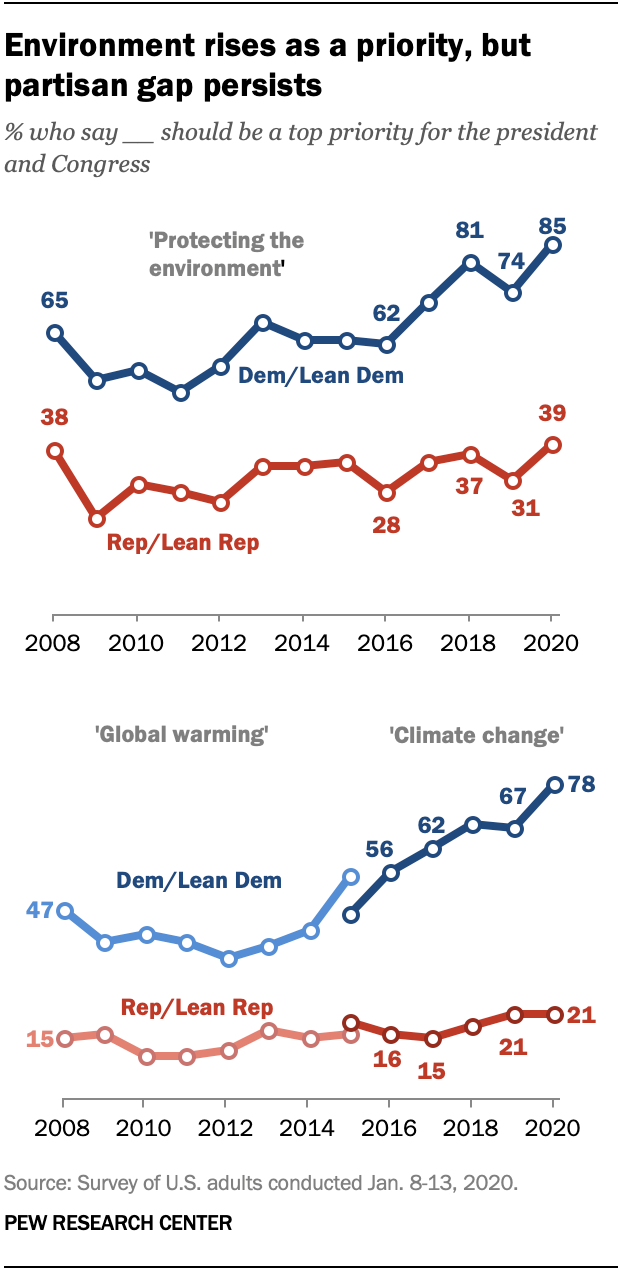 1A growing share of Americans say addressing climate change should be a top priority for the president and Congress, but most of the change has come among Democrats. Over the past four years, the share of Americans who say dealing with global climate change should be a top priority has increased from 38% to 52%. Among Democrats and independents who lean to the Democratic Party, 78% say climate change should be a top priority, up 22 percentage points since 2016. But among Republicans and Republican-leaning independents, there has been no statistically significant increase. Democrats are more than three times as likely as Republicans to say dealing with climate change should be a top priority (78% vs. 21%).
1A growing share of Americans say addressing climate change should be a top priority for the president and Congress, but most of the change has come among Democrats. Over the past four years, the share of Americans who say dealing with global climate change should be a top priority has increased from 38% to 52%. Among Democrats and independents who lean to the Democratic Party, 78% say climate change should be a top priority, up 22 percentage points since 2016. But among Republicans and Republican-leaning independents, there has been no statistically significant increase. Democrats are more than three times as likely as Republicans to say dealing with climate change should be a top priority (78% vs. 21%).
The share of Americans who say global climate change is a major threat to the well-being of the United States has also increased in recent years. But on this question too, the rise in concern has come primarily among Democrats, regardless of ideology. Among both moderate and conservative Republicans there has been no statistically significant change since 2013.
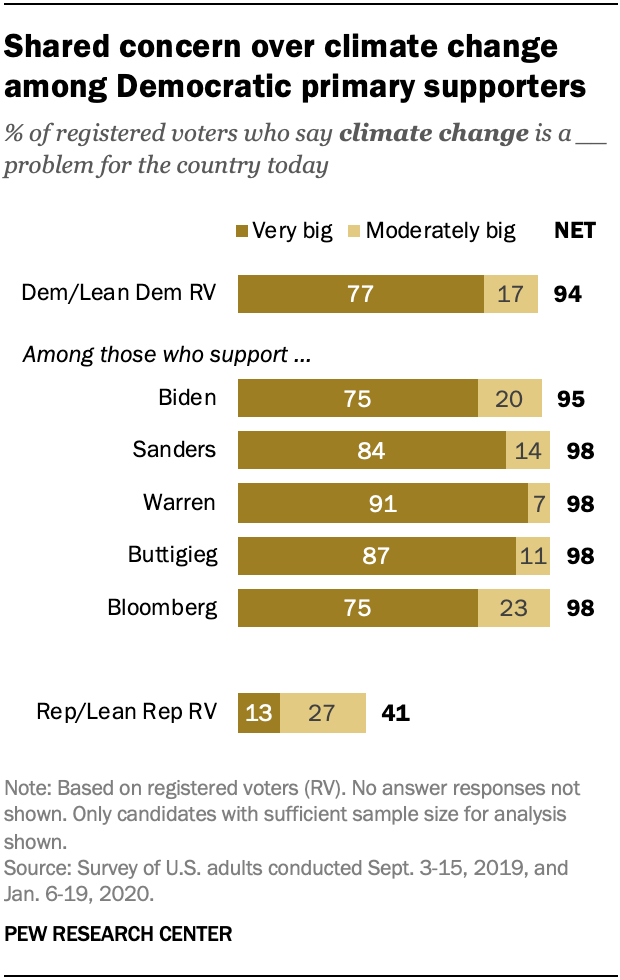 2A near-consensus of Democratic voters say climate change is a problem for the U.S. Among Democratic registered voters (including those who lean to the Democratic Party) who support any of the five leading candidates for their party’s nomination as of mid-January, more than nine-in-ten say climate change is at least a moderately big problem for the country today – including three-quarters or more who say it’s a very big problem. There are some differences in voters’ degree of concern: Joe Biden and Michael Bloomberg supporters are slightly less likely to describe climate change as a very big problem, compared with supporters of other candidates.
2A near-consensus of Democratic voters say climate change is a problem for the U.S. Among Democratic registered voters (including those who lean to the Democratic Party) who support any of the five leading candidates for their party’s nomination as of mid-January, more than nine-in-ten say climate change is at least a moderately big problem for the country today – including three-quarters or more who say it’s a very big problem. There are some differences in voters’ degree of concern: Joe Biden and Michael Bloomberg supporters are slightly less likely to describe climate change as a very big problem, compared with supporters of other candidates.
As with other issues related to climate and the environment, the partisan divide on this question is large: Just 41% of Republican registered voters (including those who lean to the GOP) say climate change is a moderately or very big problem for the country.
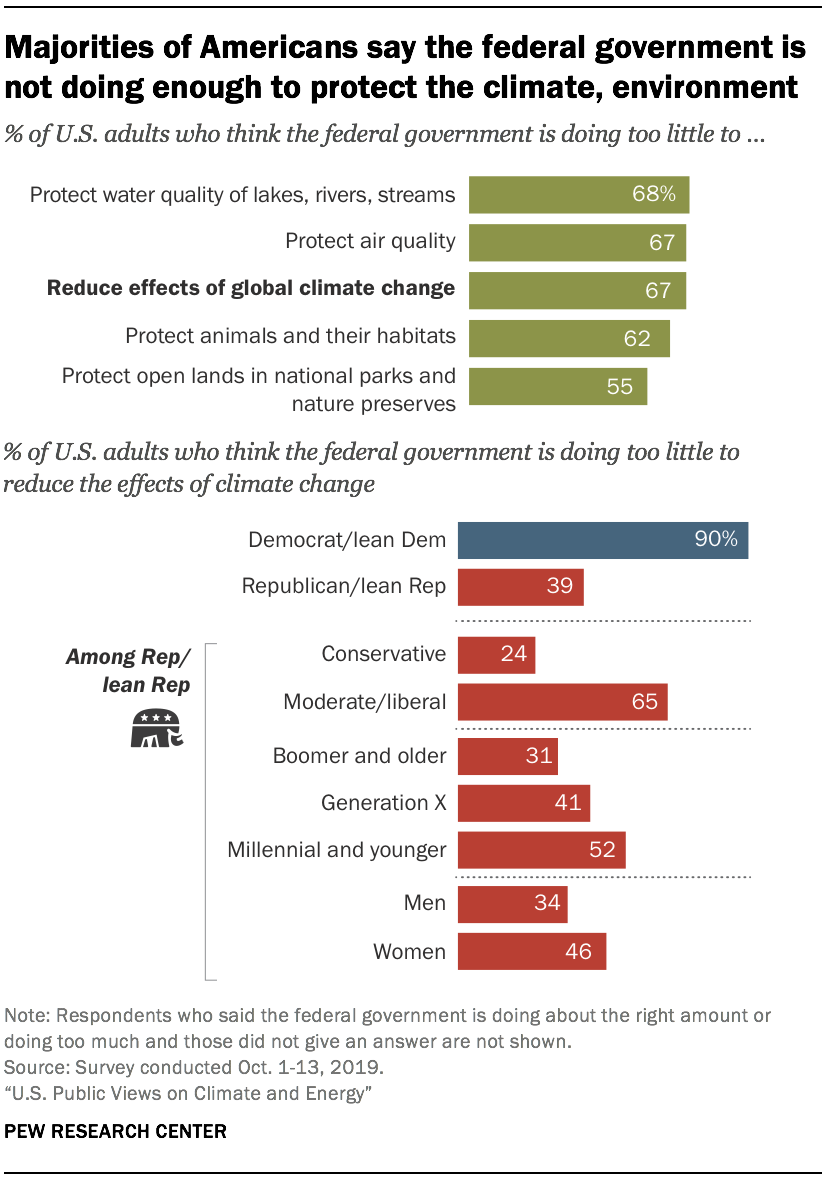 3Most Democrats think the federal government is doing too little to reduce the effects of global climate change, while opinions among Republicans are divided by ideology, generation and gender. Overall, two-thirds of Americans say the federal government is doing too little to address climate change, including 90% of Democrats and 39% of Republicans.
3Most Democrats think the federal government is doing too little to reduce the effects of global climate change, while opinions among Republicans are divided by ideology, generation and gender. Overall, two-thirds of Americans say the federal government is doing too little to address climate change, including 90% of Democrats and 39% of Republicans.
But Republicans differ widely in their views on this issue by ideology. About two-thirds of moderate or liberal Republicans (65%) say the federal government is doing too little to reduce the effects of climate change, compared with roughly one-quarter of conservative Republicans (24%).
Millennial and younger Republicans are more likely than their older GOP counterparts to think the federal government is doing too little to address climate change. And 46% of Republican women think the federal government is doing too little, while 34% of Republican men say the same.
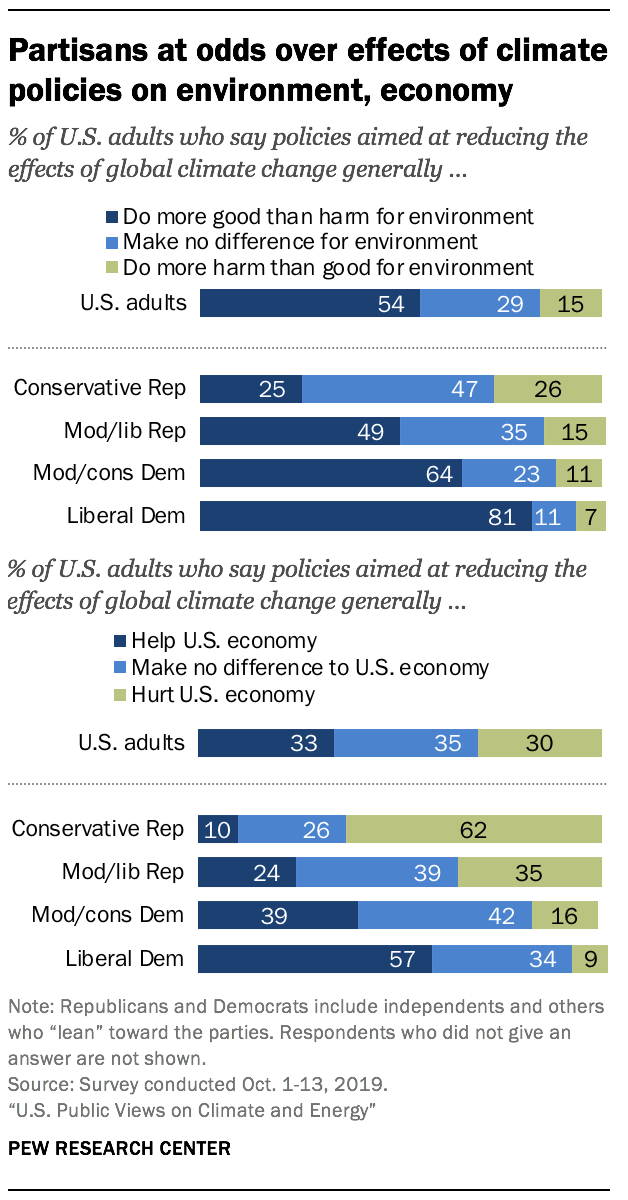 4Conservative Republicans are particularly skeptical that policies can make a difference in addressing climate change. Just one-quarter of conservative Republicans say climate change policies do more good than harm for the environment, while about half (47%) say such policies make no difference for the environment and 26% think such policies do more harm than good. By contrast, a large majority of liberal Democrats (81%) say climate change policies have net benefits for the environment.
4Conservative Republicans are particularly skeptical that policies can make a difference in addressing climate change. Just one-quarter of conservative Republicans say climate change policies do more good than harm for the environment, while about half (47%) say such policies make no difference for the environment and 26% think such policies do more harm than good. By contrast, a large majority of liberal Democrats (81%) say climate change policies have net benefits for the environment.
Similarly, in a 2018 Pew Research Center survey, conservative Republicans were less likely than other political groups to say specific policy proposals would make a difference in reducing the effects of climate change. For example, 46% of conservative Republicans said tougher fuel efficiency standards for cars and trucks would make a difference. By comparison, about two-thirds of moderate or liberal Republicans (65%) and 85% of Democrats said this proposal would make a difference in addressing climate change.
About six-in-ten conservative Republicans (62%) say climate change policies hurt the U.S. economy, while just one-in-ten think they help the U.S. economy. The balance of opinion is the opposite for liberal Democrats: 57% of liberal Democrats think that policies aimed at reducing the effects of global climate change generally help the U.S. economy, while only 9% of this group say climate change policies hurt the U.S. economy. Moderate and liberal Republicans, as well as moderate and conservative Democrats, fall in the middle on this question.
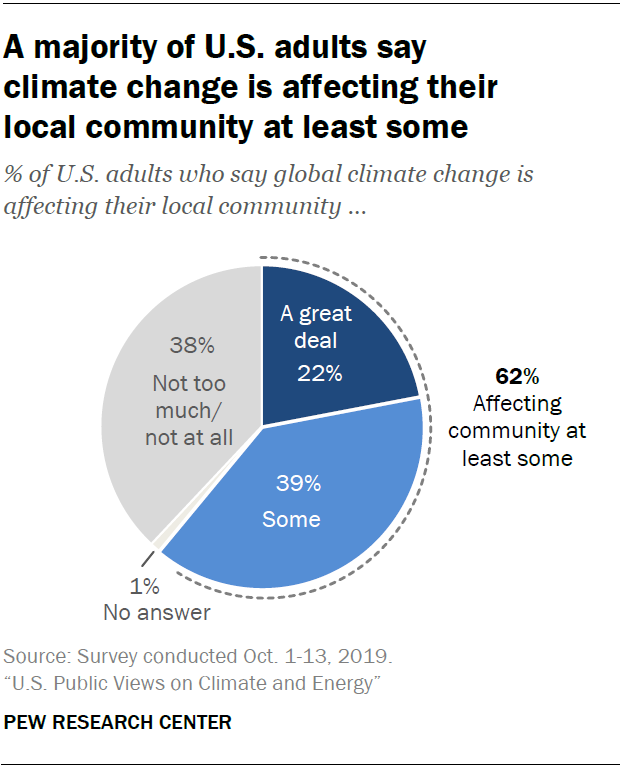 5Most Americans say climate change is having at least some impact on their local community, but this sentiment is more common among Democrats than Republicans. About six-in-ten U.S. adults (62%) say climate change is affecting their local community at least some, including 22% who say it’s impacting their community a great deal. Democrats (82%) are much more likely than Republicans (38%) to say climate change is affecting the community they live in.
5Most Americans say climate change is having at least some impact on their local community, but this sentiment is more common among Democrats than Republicans. About six-in-ten U.S. adults (62%) say climate change is affecting their local community at least some, including 22% who say it’s impacting their community a great deal. Democrats (82%) are much more likely than Republicans (38%) to say climate change is affecting the community they live in.
In addition to partisanship, geography also factors into how Americans feel about this issue. For instance, people who live in the Pacific region (72%) are more likely than those who live in the Mountain region (54%) to say climate change is affecting their community. Although more Democrats live in the Pacific region, these differences persist even after controlling for party.
Among Americans who say they’re seeing at least some local effects of climate change, large majorities report long periods of unusually hot weather (79%), severe weather like floods or intense storms (70%), harm to animal wildlife (69%) and forests (67%), and droughts (64%). More than half also say their community has been impacted by more frequent wildfires and rising sea levels (both 56%).




